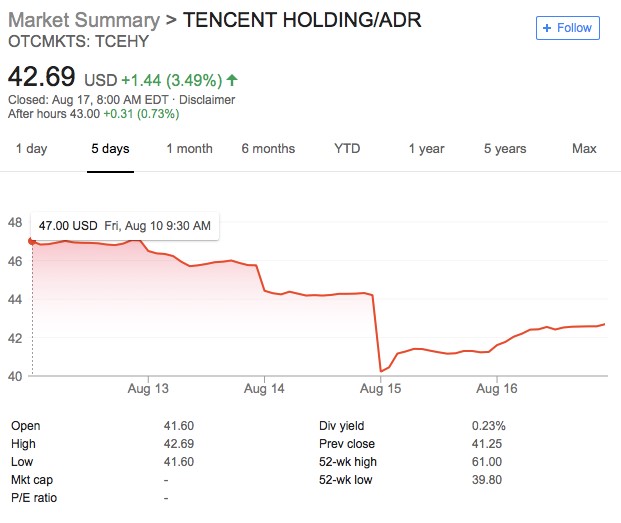After a red market week for Chinese tech stocks, trading finally jumped across the board Friday on yet another potentially short-lived prospect of a resolution to the U.S.-China tariff war. But the previous days saw a dangerous slide, especially for Chinese tech stocks.
It’s a script eerily similar to the one that played out in Silicon Valley a few weeks ago after Facebook Inc. (NASDAQ:FB) reported dismal Q2 earnings. Only this time, it’s being acted out by a cast of superstars in Shenzhen and Zhongguancun, China’s Silicon Valley.
Chinese internet stocks got slammed earlier this week after the high-flying owner of the country’s leading social media network WeChat, Tencent Holdings (OTCPK:TCEHY), reported uncharacteristically poor quarterly numbers in Wednesday premarket.
TCEHY stock tanked nearly 10 percent after the company reported the first profit contraction in 13 years. Tencent reported that revenues grew 30 percent year-over-year, but profits fell two percent to 17.9B yuan (about $2.6B) thus badly missing the consensus for 19.3B yuan.
Regulatory Crackdowns Hurting Tencent
The ‘Who’s Who’ of China’s tech has been hard-hit after Tencent’s latest earnings call:
• Bilibili (animation streaming platform)--minus 12 percent
• Huya (e-sports streaming company)—minus nine percent
• Pinduoduo (social ecommerce app)—minus six percent
• JD.com (ecommerce platform)—minus 5.2 percent
• YY (video-based social network)—minus five percent
• Alibaba (ecommerce platform)—minus four percent
• Weibo (microblogging website)—minus four percent
• Baidu (online search)—minus three percent
• Renren (social networking)—minus two percent
U.S. investors can easily relate with a good number of these tech companies. But it’s important to note there are some important differences between FB’s earnings and Tencent’s.
Whereas Facebook is a pure-play social networking company, Tencent is a multinational investment holding conglomerate that operates a variety of businesses including social media, entertainment, artificial intelligence and technology.
In fact, online gaming is the company’s biggest business. Tencent has a string of high-profile investments spanning Spotify, Snapchat, Spotify, Tesla and Hollywood film and TV.
Further, unlike FB--which reported a decline in users in some key markets--Tencent reported a nearly 10 percent Y/Y increase in combined Weixin and WeChat MAUs to 1.06 billion. Further, DAUs increased faster than MAUs indicating growing user engagement and stickiness by the platforms. Related: Venezuela’s Gold Reserves Are Reaching Critical Levels
Tencent’s profit miss can be chalked up to the core gaming business, which has been struggling due to regulatory crackdowns, in turn hitting earnings in the jaw since online games account for almost 40 percent of the company’s revenue.
The Beijing government has put a freeze on new game approvals in the country as it continues restructuring the industry. PlayerUnknown’s “Battlegrounds” is still waiting on approval in China, meaning Tencent is unable to monetize the title. “Honor of Kings” has been facing local scrutiny, which led to Tencent limiting the amount of gameplay for young players. Further, regulators recently blocked the company from selling “Monster Hunter: World” due to what it feels is inappropriate content.
Tencent conceded that it had little clarity on when things would go back to normal, leading to the latest selloff.
As of Thursday, TCEHY stock had now lost nearly $180B, or 18 percent of its value, since January.

(Click to enlarge)
It’s quite ironic that the same government that favored Tencent as a tech champion is directly responsible for its ongoing problems. New content is Tencent’s lifeblood because it relies on it to draw and retain users in its vast ecosystem of apps including WeChat and also fuel its ad machine.
Difficult comps due to stellar performance in the past as well as equity flow rotation away from stocks markets have also been taking a toll.
By Alex Kimani for Safehaven.com
More Top Reads From Safehaven.com
















